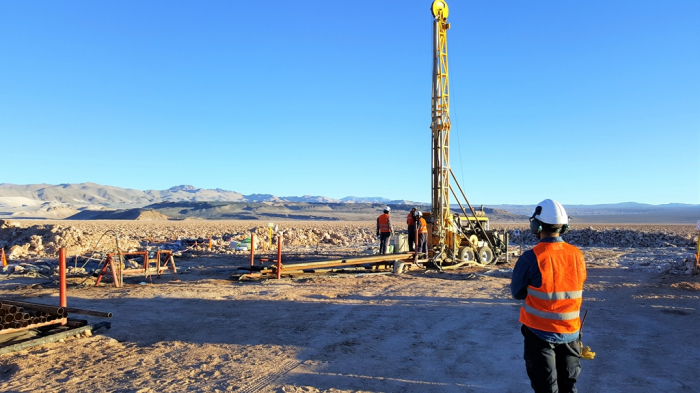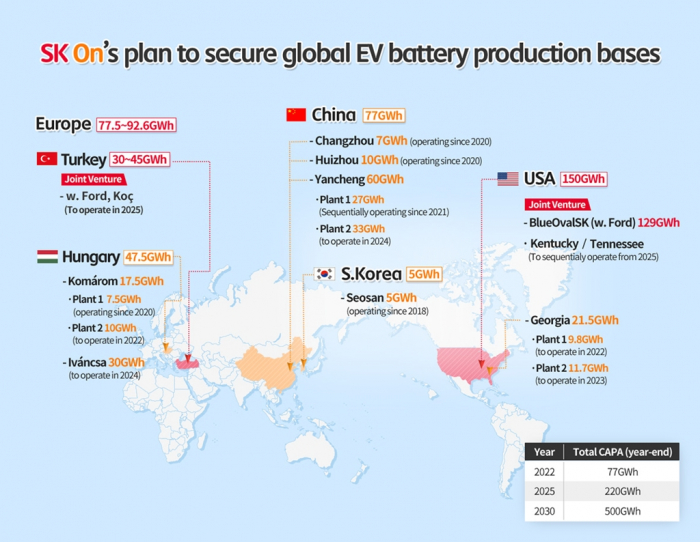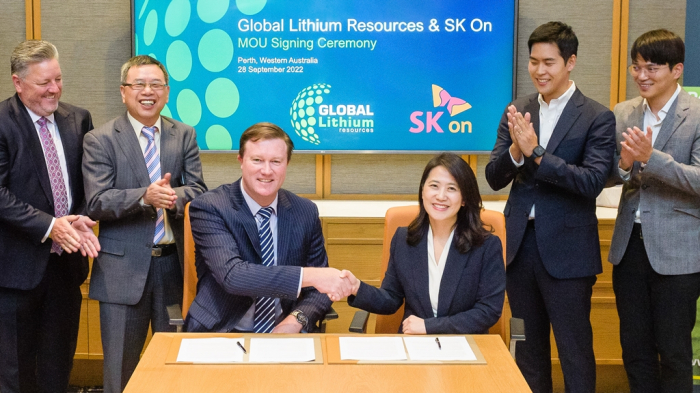Batteries
SK On in 10-year lithium deal with Australia’s Lake Resources
Securing the core material from Lake will make SK batteries eligible for Washington’s electric vehicle tax credit
By Oct 12, 2022 (Gmt+09:00)
2
Min read
Most Read
LG Chem to sell water filter business to Glenwood PE for $692 million


Kyobo Life poised to buy Japan’s SBI Group-owned savings bank


KT&G eyes overseas M&A after rejecting activist fund's offer


StockX in merger talks with Naver’s online reseller Kream


Mirae Asset to be named Korea Post’s core real estate fund operator



SK On Co., a leading South Korean battery maker, said on Wednesday it has signed a long-term contract to procure lithium, a key battery material, from Australian miner Lake Resources NL.
As part of the deal, SK On, a unit of SK Innovation Co., will also acquire a 10% stake in Lake Resources via a third-party rights offering by the end of June 2023.
Under the contract, SK On will receive 15,000 tons a year of high-purity lithium for two years from the fourth quarter of 2024. The volume will be increased to 25,000 tons a year for the following three years.
SK On said the deal can be extended for another five years and it is expected to receive a total of 230,000 tons of lithium over 10 years, enough to make batteries for 4.9 million electric vehicles.

Established in 1997, Lake Resources owns and develops four lithium brine assets and one lithium mine in Argentina. SK On will be supplied the mineral from Lake’s flagship Kachi Project.
The four projects are located in Argentina’s Lithium Triangle, where 40% of the world's lithium is procured -- and one of the cheapest places globally from which to secure it.
ELIGIBLE FOR US TAX CREDIT
Securing the core battery cell material from Lake will make its products eligible for the US government’s EV tax credit that favors batteries with parts made in the US or its free trade partners.
The US Inflation Reduction Act (IRA), signed into law by US President Joe Biden in August, requires a certain percentage of critical minerals used in EV batteries to come from the US or its free trade partners.
From next year, EV makers must use batteries with materials sourced primarily in North America for their cars to be eligible for the tax credit of up to $7,500 per unit.

Qualifying EVs must contain at least 40% of the battery minerals and 50% of the battery components from those countries. The proportion will rise to 80% for minerals by 2027 and 100% for parts by 2029.
"SK On is very pleased to execute this deal with Lake, which can allow us to secure a stable lithium supplier for our US supply chain," said SK Vice President Ryu Jinsuk.
SECOND AUSSIE DEAL
SK, which counts Ford Motor, Volkswagen and Hyundai Motor Co. among its major clients, said last month it signed a lithium procurement deal with another Australian mining firm, Global Lithium Resources Ltd.
Automobile and battery makers have been signing deals with miners in countries with FTA agreements with the US such as Australia and Canada to secure minerals for EV batteries.

LG Energy Solution Ltd., SK On’s bigger rival, said in mid-September it has inked battery materials supply deals with three Canadian minerals companies.
Under separate contracts, LG, which counts Tesla Inc. as one of its clients, will receive cobalt sulfate from Electra Battery Materials Corp. and lithium hydroxide from Avalon Advanced Materials Inc. and Snow Lake Resources Ltd.
The IRA, aiming to diminish China’s power in the global EV market, is also expected to impact Korea’s finished car makers. Hyundai Motor Group’s main EVs, such as the IONIQ 5 and the EV6, are manufactured in Korea and exported to the US and other markets.
Write to Hyung-Kyu Kim at khk@hankyung.com
In-Soo Nam edited this article.
More to Read
-
 BatteriesSK On inks lithium deal with Australian firm for US tax credit
BatteriesSK On inks lithium deal with Australian firm for US tax creditSep 29, 2022 (Gmt+09:00)
3 Min read -
 BatteriesLG Energy in cobalt, lithium deals with three Canadian suppliers
BatteriesLG Energy in cobalt, lithium deals with three Canadian suppliersSep 23, 2022 (Gmt+09:00)
3 Min read -
 BatteriesHyundai Motor, LG Energy secure $710 mn for battery JV in Indonesia
BatteriesHyundai Motor, LG Energy secure $710 mn for battery JV in IndonesiaAug 22, 2022 (Gmt+09:00)
2 Min read -

-
 BatteriesPOSCO, SK On forge strategic tie-up in rechargeable battery business
BatteriesPOSCO, SK On forge strategic tie-up in rechargeable battery businessJun 16, 2022 (Gmt+09:00)
1 Min read
Comment 0
LOG IN


